Ministry in
Drelów
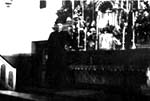 The parish of Drelów was known for its Uniate
traditions. On 17 January 1874 the church was taken from the
Uniates and converted into an Orthodox church. At that time
thirteen Uniates were shot dead for their faith. The parish of Drelów was known for its Uniate
traditions. On 17 January 1874 the church was taken from the
Uniates and converted into an Orthodox church. At that time
thirteen Uniates were shot dead for their faith.
In the summer of 1915,
after the withdrawal of the Tsarist troops, Drelów was
occupied by the Germans; they turned the church into a
granary, the rectory into a dairy, and the farm buildings
into various military facilities. This situation lasted
until 17 November 1918, when the Germans were disarmed.
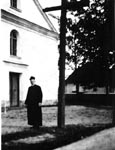 On
the morning of 17 January 1919, which was a Friday, the
parish priest of the Międzyrzec parish of St Nicholas, Rev.
Leon Wydżga, and the young rector Rev. Karol Leonard
Wajszczuk arrived in Drelów. The residents of Drelów and the
neighbouring villages gathered in front of the church and
welcomed the distinguished guests with bread and salt. The
parish priest introduced Rev. Wajszczuk to those assembled
as the man entrusted by the Bishop of Podlasie with the task
of restoring the parish of Drelów. People wept with emotion. On
the morning of 17 January 1919, which was a Friday, the
parish priest of the Międzyrzec parish of St Nicholas, Rev.
Leon Wydżga, and the young rector Rev. Karol Leonard
Wajszczuk arrived in Drelów. The residents of Drelów and the
neighbouring villages gathered in front of the church and
welcomed the distinguished guests with bread and salt. The
parish priest introduced Rev. Wajszczuk to those assembled
as the man entrusted by the Bishop of Podlasie with the task
of restoring the parish of Drelów. People wept with emotion.
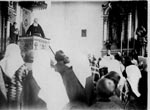 A "Temporary
Church Council” was immediately formed, headed by Michał
Zieniuk, a respected farmer from Drelów. During the first
days the rectory was put in order: stoves, windows and doors
were repaired, woodwork was painted with oil paint, and the
rooms were whitewashed. From 20 January Rev. Karol Wajszczuk
lived in the rectory in Drelów and personally supervised all
the work. Cleaning and repair work at the rectory, the
church and the parish farm buildings lasted more than two
months. During this time Rev. Wajszczuk visited every
village that was to be included in the newly organised
parish. A "Temporary
Church Council” was immediately formed, headed by Michał
Zieniuk, a respected farmer from Drelów. During the first
days the rectory was put in order: stoves, windows and doors
were repaired, woodwork was painted with oil paint, and the
rooms were whitewashed. From 20 January Rev. Karol Wajszczuk
lived in the rectory in Drelów and personally supervised all
the work. Cleaning and repair work at the rectory, the
church and the parish farm buildings lasted more than two
months. During this time Rev. Wajszczuk visited every
village that was to be included in the newly organised
parish.
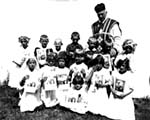 On 4 April 1919 the Catholic parish in Drelów was
solemnly erected, and on 26 April 1919 Rev. Karol L.
Wajszczuk received a nomination from the Diocesan Curia as
parish priest of this parish. On 4 April 1919 the Catholic parish in Drelów was
solemnly erected, and on 26 April 1919 Rev. Karol L.
Wajszczuk received a nomination from the Diocesan Curia as
parish priest of this parish.
In the autumn of 1919,
in addition to his duties as parish priest, Rev. Karol
Wajszczuk took on the duties of a religion teacher in
primary schools in Drelów, Łózki and Żerocin, and in the
following years also in Kwasówka. He continued this work
systematically until 1939.
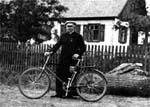 Concerned about revitalising parish life, including
the cult of St Onuphrius, Rev. Wajszczuk undertook efforts
to restore the abandoned church in Horodek. On 12 June 1919,
on the feast of St Onuphrius, the church was solemnly
blessed. Leaving this temple in the wilderness without any
care seemed to the parish priest of Drelów to be reckless.
Therefore, in the spring of 1920 he settled a “hermit” in
Horodek who, living on alms, devoted himself to God’s
service and cared for this place of worship without
demanding payment. Concerned about revitalising parish life, including
the cult of St Onuphrius, Rev. Wajszczuk undertook efforts
to restore the abandoned church in Horodek. On 12 June 1919,
on the feast of St Onuphrius, the church was solemnly
blessed. Leaving this temple in the wilderness without any
care seemed to the parish priest of Drelów to be reckless.
Therefore, in the spring of 1920 he settled a “hermit” in
Horodek who, living on alms, devoted himself to God’s
service and cared for this place of worship without
demanding payment.
 In the autumn of 1920, concerned about improving the
efficiency of the parish farm, he employed a permanent farm
manager, Michał Strok, and a housekeeper, Franciszka Wisztel.
The choice of these people proved very accurate; they
remained faithful to their parish priest throughout the
interwar period. In the autumn of 1920, concerned about improving the
efficiency of the parish farm, he employed a permanent farm
manager, Michał Strok, and a housekeeper, Franciszka Wisztel.
The choice of these people proved very accurate; they
remained faithful to their parish priest throughout the
interwar period.
 Concerned about
the development of religious life in the parish, Rev.
Wajszczuk began efforts to establish a Rosary confraternity
and the Third Order of St Francis (tertiaries). For this
purpose, on 25 April 1921 he submitted a request to the
Podlasie Diocesan Curia in Janów asking for appropriate
permissions from the Holy See. The Church authorities
responded positively to this request. Concerned about
the development of religious life in the parish, Rev.
Wajszczuk began efforts to establish a Rosary confraternity
and the Third Order of St Francis (tertiaries). For this
purpose, on 25 April 1921 he submitted a request to the
Podlasie Diocesan Curia in Janów asking for appropriate
permissions from the Holy See. The Church authorities
responded positively to this request.
An important event of
that period was also the installation in the church belfry
of a large bell named “Stanisław”, which served until June
1940, when it was destroyed by the occupiers.
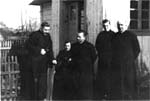 In the mid-1920s Rev. Wajszczuk became friends with
teachers of the Drelów school: Leżyński, A. Kocukowa and A.
Ząbkówna; he also maintained social relations with the
tenant of the Drelów estate, Markowski. During this period,
thanks to Rev. Karol’s personal involvement, a youth choir
was formed at the church in Drelów as well as theatre groups
in Łózki and Drelów. For the first five years after the
founding of the church choir, Rev. Karol was its direct
leader; he selected the repertoire of hymns for particular
services, conducted vocal exercises and rehearsals. In 1929
he was replaced in this work by the newly appointed organist
Antoni Patkowski. In the 1930s the church choir led by him
took second place in the provincial eliminations in Lublin
in 1937. Older residents of the Drelów parish still remember
their organist from those years, Antoni Patkowski; he was a
faithful friend of Rev. Karol and, like him, suffered a
martyr’s death for his fidelity to the Church and the
Fatherland. In the mid-1920s Rev. Wajszczuk became friends with
teachers of the Drelów school: Leżyński, A. Kocukowa and A.
Ząbkówna; he also maintained social relations with the
tenant of the Drelów estate, Markowski. During this period,
thanks to Rev. Karol’s personal involvement, a youth choir
was formed at the church in Drelów as well as theatre groups
in Łózki and Drelów. For the first five years after the
founding of the church choir, Rev. Karol was its direct
leader; he selected the repertoire of hymns for particular
services, conducted vocal exercises and rehearsals. In 1929
he was replaced in this work by the newly appointed organist
Antoni Patkowski. In the 1930s the church choir led by him
took second place in the provincial eliminations in Lublin
in 1937. Older residents of the Drelów parish still remember
their organist from those years, Antoni Patkowski; he was a
faithful friend of Rev. Karol and, like him, suffered a
martyr’s death for his fidelity to the Church and the
Fatherland.
 In
1933 Rev. Wajszczuk carried out the renovation of the
interior of the church in Horodek. In the same year a chapel
in Łózki was consecrated; at the same time funds began to be
collected for the purchase of an organ for the church in
Drelów. In
1933 Rev. Wajszczuk carried out the renovation of the
interior of the church in Horodek. In the same year a chapel
in Łózki was consecrated; at the same time funds began to be
collected for the purchase of an organ for the church in
Drelów.
In mid-August 1931 Rev.
Wajszczuk received a significant distinction, as by decree
of the President of the Republic of Poland of 7 July 1931 he
was awarded the Cross of Independence for his work in the
cause of regaining independence. Rev. Karol accepted this
decoration, as an expression of social recognition, with
deep emotion.
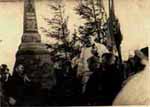 On 8
November 1936 a monument to the Polish Military Organization
was solemnly unveiled in Łózki. For many months during the
First World War Rev. Karol Wajszczuk had served as chaplain
of the POW district of Kąkolewnica–Turów. Later, during the
Second World War, he also actively engaged in organising the
underground resistance. The monument in Łózki commemorated
in particular the fallen members of the POW from the area of
Drelów and Łózki. On 8
November 1936 a monument to the Polish Military Organization
was solemnly unveiled in Łózki. For many months during the
First World War Rev. Karol Wajszczuk had served as chaplain
of the POW district of Kąkolewnica–Turów. Later, during the
Second World War, he also actively engaged in organising the
underground resistance. The monument in Łózki commemorated
in particular the fallen members of the POW from the area of
Drelów and Łózki.
In the autumn of 1938
the whole of Poland learned about the parish of Drelów, as
Gazeta Świąteczna,
no. 3009 of 2 October 1938, wrote that Bishop Henryk
Przeździecki instructed the priests of his diocese to call
on the faithful for four Sundays to submit testimonies in
parish offices regarding persecutions of the Uniates, their
martyrdom, and any graces received through their
intercession.
Rev. Wajszczuk
announced the bishop’s instruction three times from the
pulpit, and descendants and relatives of the Uniates killed
in 1874 brought various testimonies to the parish office.
The parish priest forwarded these materials to the Diocesan
Curia in Siedlce. However, the Uniate cause was overshadowed
by the sudden death of Bishop Przeździecki and the outbreak
of the Second World War.
The events connected
with the aggression of Hitler and Mussolini in 1939 caused
anxiety in Polish society. War was approaching. In the face
of the coming danger, the conference of Polish bishops
meeting in Warsaw in April 1939 issued an appeal to priests
and the faithful calling for full dedication to the defence
of the independence of the Fatherland. Rev. Karol Wajszczuk
faithfully carried out all the directives of this appeal. He
celebrated services for the prosperity of Poland and peace
in the world, and until almost the end of 1939, already
during the German occupation, Sunday services ended with the
singing of the supplications and
Boże coś Polskę.
|